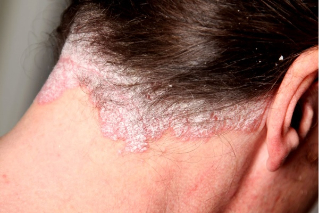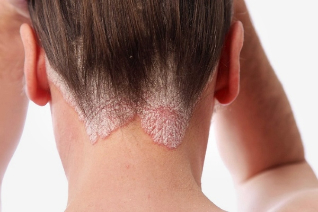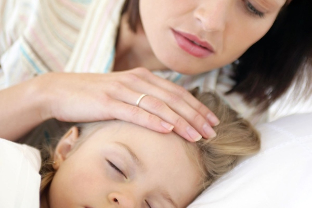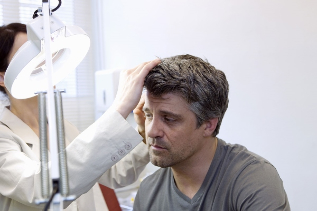Psoriasis is a skin infectious disease, which meets at least 1 out of 100 people, and 80% of the cases, reveals the defeat of the scalp. It is manifested in the form of education, red, platelets, or spots, between which is the visible skin intact. Inflammation can spread and join together. Why is it the psoriasis and how is it treated, we'll find out later.
A brief guide on disease

Psoriasis in the head - it is an autoimmune disease. This conclusion by the doctors was done after that, in the course of studies in platelets have identified specific for the autoimmune disease changes, and drug therapy to suppress immunity drugs has allowed to greatly facilitate the general state. This disease is not transmitted from patient to a healthy person.
Psoriasis can strike anyone, however, the clinical experience allows you to highlight the main groups at risk. So, often, the disease affects women, and genetically inherited form of knowing in 15-25 years. Ill more than 50% of cases have relatives with psoriasis one form or the other. This means that the risk of facing a similar pathology higher than those whose parents, brothers or sisters are also a type of diagnosis. Psoriasis of the scalp, usually, it can affect the following areas:
- separations;
- the upper part of the forehead;
- the area behind the ears;
- whisky;
- nape of the neck;
- the skin on the ears, including the ears;
- doug's eyebrows.
As a general rule, so the psoriasis has wave nature of the current, that is, assumes alternating periods of improvement and exacerbation. With this in the affected areas appear red teardrop-shaped platelets with just the content, which is periodically sloughed off and cause itching. A similar inflammatory process does not lead to serious consequences for the health, but it becomes a cause of serious psychological problems. Very often occurs a vicious circle, when the psoriasis is the cause of the stress, and he, in turn, becomes the cause of complications, loss of the disease.
The disease itself does not cause hair loss, however, at the time alopecia can lead some methods of therapy, stress or damage to the skin. Usually, hair will grow back after the cleaning of the skin and the stabilization of the emotional state.
Why occurs?

The doctors still do not know the exact causes that cause inflammatory reactions and excessive synthesis of skin cells on the body of the patient. At this time the main hypothesis is genetic. It is said that some people have a predisposition innate to accelerate the renewal of the keratinocytes (the main cells of the epidermis a person's skin). When the manifestation of psoriasis, such a trend causes a specific response of the immune system:
- The body begins accelerated to produce new cells that form causing psoriatic plaques.
- Happens to the most active inflammation of the skin in the affected area (the body perceives it as something foreign).
- How much stronger is wounded, the skin under the influence of immunity, the more it occurs the division of the keratinocytes.
For a long time, genetic factors may remain in a latent state, but awake under the influence of unfavorable factors. These include:
- Stress. Changes in the nervous system become a cause of irregularities in the functioning of all the organs including the skin. In the end, this leads to changes in the division of epithelial cells.
- Frequent lesions of the skin. They cause abnormalities in the process of division and growth of keratinocytes.
- The infectious diseases. The microbes that attack the immune system of a person, especially if the disease has a chronic form. Consequently, the immunity is constantly in tension and begins to attack the epithelial cells.
- Dryness and sensitivity of skin. In this case, the skin is often affected by minor injuries, and then is high the chances of developing psoriasis.
- The climatic conditions. When it is dry and the cold air the skin is exposed advanced load, as a result, the possible violations, which will lead to psoriasis.
- Diseases of the endocrine system. They become the cause of errors in the production of melatonin, causing an increased secretion of growth hormone.
Another popular hypothesis states that psoriasis develops due to metabolism disorders. In this case, the body specifically reacts to the stimuli, starting with the rapid division of the cells of the dermis. If it is normal, the skin renews itself for 3 weeks, in patients this happens for 5 days, carrying on the head appear numerous platelets. In this case, can result in a deterioration in factors:
- injury of the scalp;
- emotional fatigue and stress;
- hormonal disorders;
- diseases of the endocrine system;
- bad habits (smoking, abuse of alcoholic beverages);
- infectious processes in the body;
- incorrect power supply;
- the intake of some drugs;
- hypothermia, or prolonged exposure to the cold;
- the use of poor-quality care products of the scalp.
In some cases, a pitcher of departure for the development of psoriasis can become a disease of the immune system, which can occur because of stress or have suffered from an infectious disease.
Revealed that the HIV-infected suffer from psoriasis in 3 times more, than healthy people.
As the disease manifests itself?
Psoriasis develops gradually, and its possible to identify the different stages of the following processes:
- On the surface of the skin appear pink precipitation, which has a rounded shape, and the upper part covered with numerous plaques of white color.
- Rashes gradually grow and increase in diameter. At the end turn into padded causing psoriatic plaques that cause itching and burning. After strong starts the inflammatory process.
- Tissue excessively grow up under the pressure of an excess of breeding ectodermal cells, platelets and excessive accumulation of lymphocytes and macrophages. This leads to a thickening of the skin in places of defeat and the formation of red spots in the area of hair growth.
- The patient feels a general malaise and weakness. Might skip the body temperature.
- The skin becomes sensitive, painful, dense. Little by little it loses its elasticity, becomes rougher and covered with plates, which quickly crumbles.
- When combing the scalp is covered from the bleeding scratches and cracks.
- The platelets gradually sloughed out, and then in the hair, it is possible to see the enormous layers, similar to dandruff.
- The itching becomes more intense and also gives a man to do the usual things.
- The man is in stasis, or constantly breaks down, a feeling of great aesthetic problem.
- The disease spreads over the scalp and other parts of the body.
In order to reduce the manifestations of psoriasis, it is necessary when the first eruptions of the skin on the head to consult a dermatologist, to pass the examination and start the treatment.
The characteristics of the symptoms in children

Psoriasis of the scalp of the child develops almost the same, as in adults, but more often, the disease makes you feel such symptoms:
- redness of the scalp, which is also seen through the scalp;
- wet softening of the skin, which in medicine is called maceration;
- desquamation of the platelets;
- the formation of build-ups of plaque in some areas of the scalp.
In children of the youngest age group psoriasis often reminds us, the formation of diaper rash. The disease develops slowly and is difficult to treat.
Classification of pathology
The scalp psoriasis is classified according to two parameters - the shape and the phase of development. Depends on them how the disease. Each parameter considered separately.
The form
The form of psoriasis is of two types:
- Easy. Mainly occurs on the head in the shape of individual lesions. Usually, the platelets are small in size and covered with thin plates.
- Heavy. Psoriatic elements appear on the entire scalp. Size of the plate, and more, and the thickness, compared to when you find the severity of the disease.
Phase
The experts distinguish three phases of pathology:
- Progressive. On the scalp, the new eruptions. As a general rule, that relate to the area of the contour of the hair growth. On psoriatic elements appears to be flaking. Gradually, the islets of skin rashes can join together, forming large areas of losses. If the phase happens during the recurrence of the disease, or the already available elements are distributed in the periphery, which is referred to as a phenomenon Kebner.
- Fixed. The inflammatory process persists, however, does not appear to be new eruptions. For this phase it is typical to blunting of the growth of platelets, and the lack of hyperemic rim along the contour of the skin elements.
- Regressive. It reduces the amount of skin rashes, which indicates the effectiveness of the therapy. Gradually disappear the plates, which alternate with patches of pigment. The patient is most worried about scaling, itching, and other symptoms of the disease.
Diagnostics

If there are rashes on the scalp, it is necessary to consult a dermatologist. Can also be made with the consultation of a specialist for the treatment of hair (officia), and beautician, who will help you choose shampoos and other care products. The diagnosis of the disease plays an important role, the identification of a psoriasis triad composed of these phenomena, such as:
- Stearic spots. It enriches the skin peeling and the plates are silver in colour and resemble stearin.
- Of psoriasis the film. If you remove the inserts, in their place appears a shiny wet surface.
- Blood pink. When combing of platelets is displayed, the drip point of bleeding.
These symptoms enable a diagnosis already in the visual examination. When the doctor takes into account the data of anamnesis, including clarifying if the patient and their relatives who suffer from psoriasis. To confirm the diagnosis, your doctor may prescribe a biopsy (the material of the fence with of the affected areas) and the planting of flora for the elimination of fungal defeat. In the case of generalized psoriasis further rent in the common analysis of blood. When the intoxication of the body will show a high speed of erythrocyte sedimentation (ESR) and a high number of white blood cells.
General medicine
The scalp psoriasis requires a customized treatment that helps to relieve the unpleasant symptoms, and, above all, to get a prolonged period of remission in any form of the disease. To this end, it is often assigned a complex therapy. Each component deserves special attention.
Aims to combat the inflammatory reactions in chronic, excess formation of de keratocytes, and as it is of pathological processes, which are the basis of the disease. In the context of a therapy, the doctor may prescribe the following medications:
- tools of immunotherapy with non-specific (Pirogenala, ATP);
- vitamin complexes;
- immunomodulatory;
- aromatic retinoids (Etretinate, Acitretin);
- cytostatic;
- corticosteroids;
- the solution Gemodeza intravenous drop introduction.
The reception of these substances and corticosteroids is advisable in the case of heavy loss of psoriasis, and of considerable severity of the symptoms on the scalp. If the psoriasis is also difficult to add a infection, in the course of treatment are antibiotics.
In the context of a therapy, the doctor may also prescribe antidepressant medications. That is necessary in order to reduce and eliminate related psoriasis and psycho-emotional problems of depression, stress, increased anxiety and socialis phobia. In addition, these drugs can increase the resistance of the patient to the stress, reduce the frequency and severity of exacerbations of psoriasis on the background of nervous tension, improve sleep quality. Some drugs have effects antihistamine, and also help to relieve the itching.























